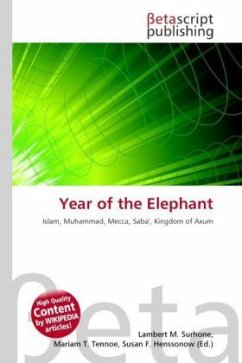High Quality Content by WIKIPEDIA articles! The Year of the Elephant (in Arabic, , 'Âm al-Fîl) is the name in Islamic history for the year approximately equating to 570 AD. According to Islamic tradition, it was in this year that Muhammad was born. The name is derived from an event said to have occurred at Mecca in which Abraha, the Pagan (or possibly Christian) ruler of the principality of Saba' in Yemen (although differing accounts make him either a viceroy of the Kingdom of Axum or as having broken away and styled himself King of Saba'), marched upon the Kaaba with a large army, which included one or more elephants, intending to demolish it. However, the elephant is said to have stopped at the boundary around Mecca, and refused to enter. The year came to be known as the Year of the Elephant, beginning a trend for reckoning the years in Arabia which was used until it was replaced with the Islamic calendar during the rule of Umar. Recent discoveries in southern Arabia suggest that Year of the Elephant may have been 569 or 568, as Persians overthrew the Abyssinian regime in Yemen around 570.
Bitte wählen Sie Ihr Anliegen aus.
Rechnungen
Retourenschein anfordern
Bestellstatus
Storno








